IS conflict: US arming Syrian Kurds unacceptable - Turkey
- Published
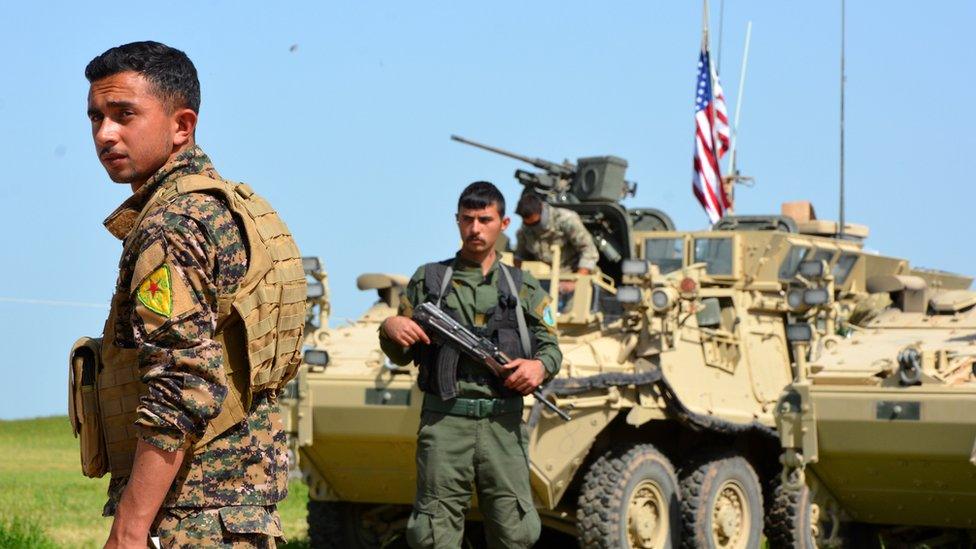
The US deployed armoured vehicles to protect YPG fighters after recent Turkish air strikes
Turkey has called on the US to reverse its decision to arm Syrian Kurdish Popular Protection Units (YPG) fighters battling so-called Islamic State.
President Recep Tayyip Erdogan said the fight against the jihadists should not involve "another terrorist group".
Ankara considers the YPG an extension of the banned Kurdistan Workers' Party (PKK), which has fought for Kurdish autonomy in Turkey for three decades.
Washington disagrees and insists the YPG is needed to capture IS-held Raqqa.
The YPG leads the Syrian Democratic Forces (SDF), an alliance of Kurdish and Arab militias that has driven IS militants from about 6,000 sq km (2,300 sq miles) of northern Syria over the past two years with the help of US-led coalition air strikes.
On Wednesday evening, the SDF said it had taken seized the strategically important town of Tabqa, 40km (25 miles) west of Raqqa, and its nearby dam.
On Tuesday, Pentagon spokeswoman Dana White announced that President Donald Trump had given his authorisation to "equip Kurdish elements of the Syrian Democratic Forces as necessary to ensure a clear victory" over IS in Raqqa.
Ms White also stressed the Pentagon was "keenly aware" of Turkey's concerns.
"We want to reassure the people and government of Turkey that the US is committed to preventing additional security risks and protecting our Nato ally."
"The US continues to prioritise our support for Arab elements of the SDF. Raqqa and all liberated territory should return to the governance of local Syrian Arabs."
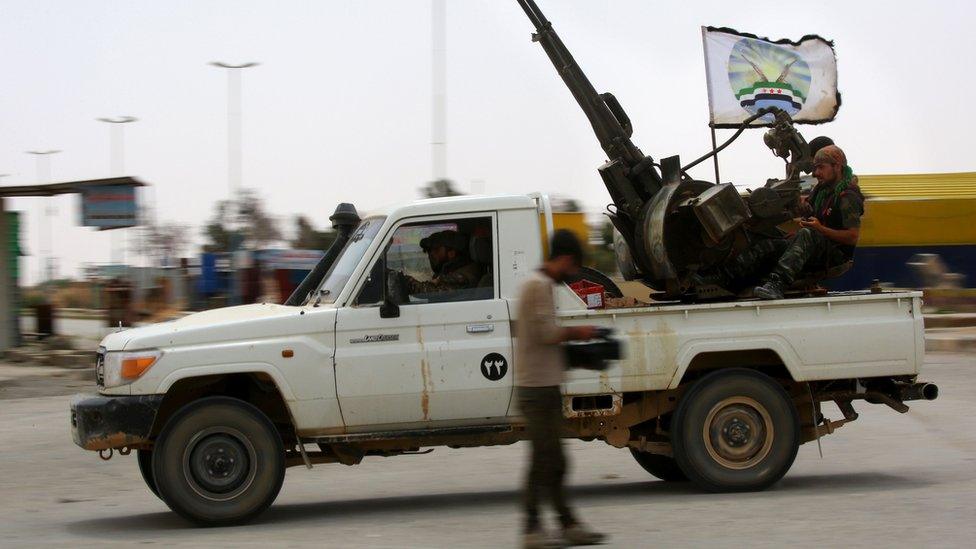
SDF fighters are attempting to isolate Raqqa before launching an assault on the city
The Pentagon has previously armed only Arab elements of the SDF.
Turkey's leadership called Mr Trump's decision "unacceptable" on Wednesday.
"The US administration still has chances to consider Turkey's sensitivities on the PKK. If there is a decision otherwise, this will surely have consequences and will yield a negative result for the US as well," Prime Minister Binali Yildirim told reporters in Ankara.
Foreign Minister Mevlut Cavusoglu said every weapon obtained by the YPG constituted "a threat to Turkey".
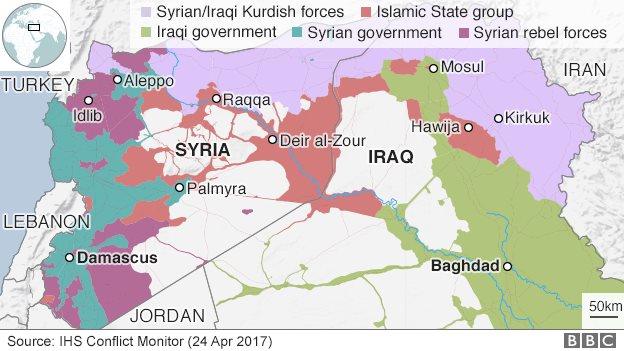
Later, President Erdogan told a news conference that he hoped "very much that this mistake will be reversed immediately" and promised to "personally express our worries in a detailed way" when he meets Mr Trump in Washington on Tuesday.
"We want to believe that our allies would prefer to be side by side with ourselves rather than with the terrorist groups," he said, adding that "fighting a terrorist group with the help of another terrorist group is a mistake".
Egemen Bagis, ally of Turkish President Erdogan, says it is "illogical" for the US to arm Syrian Kurds
The YPG and its political arm, the Democratic Union Party (PYD), denies any direct links with the PKK, whose insurgency has left thousands dead.
The BBC's Mark Lowen in Istanbul says the US decision was a huge slap in the face for its ally, which had consistently said arming the Kurds would be its "red line".
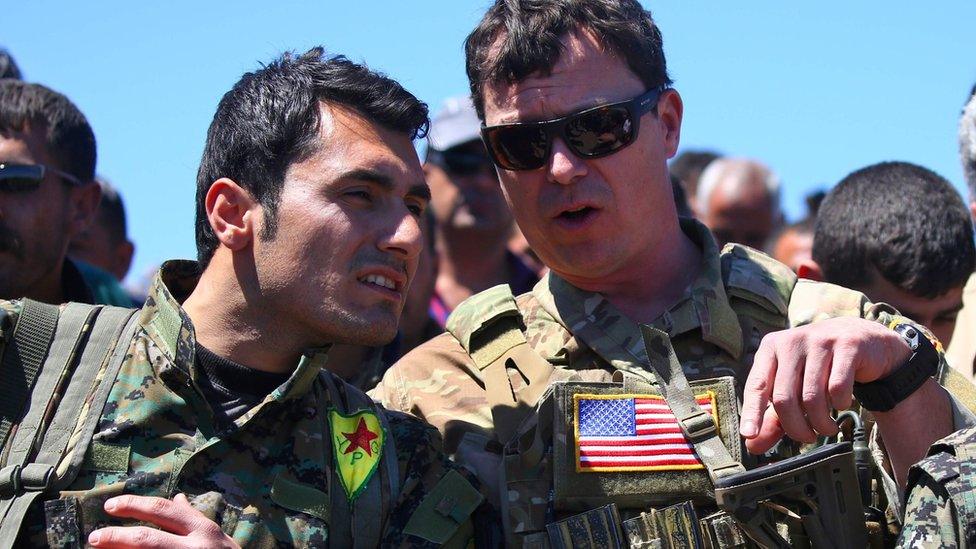
US-led coalition military advisers are already assisting YPG fighters
Ankara is particularly irked that it was announced days before Mr Erdogan's visit to Washington and as Turkish high-level officials there were urging the White House not to go ahead, our correspondent adds.
Mr Erdogan has argued that the YPG should be excluded from the Raqqa offensive and urged the US to switch to supporting a Syrian Arab rebel force that has driven IS out of a border area in the past year with the help of the Turkish military.
Ms White said the equipment provided to the Kurds - who make up 40% of the SDF's 50,000 fighters, according to US-led coalition officials - would be "limited, mission specific and metered out incrementally as objectives are reached".
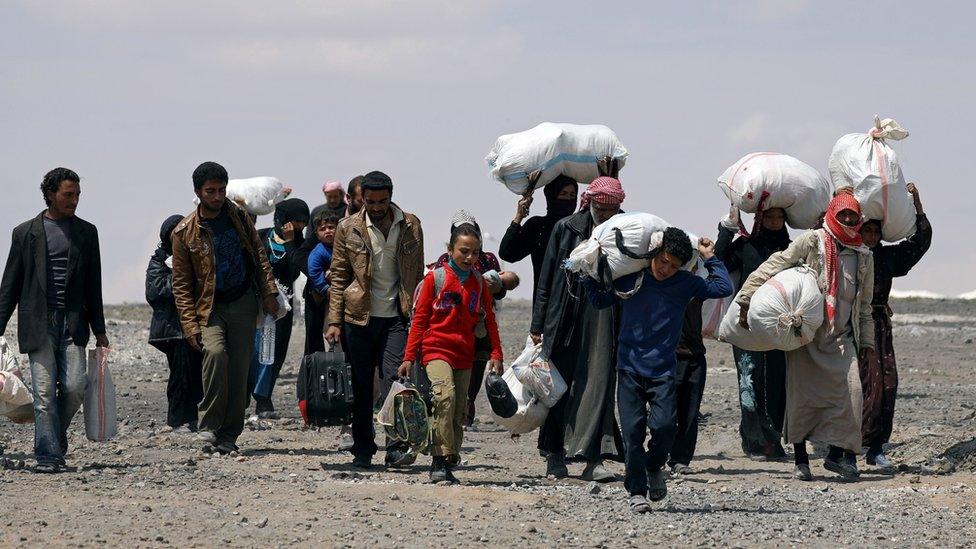
Civilians have been fleeing the Raqqa area in anticipation of the SDF's assault
She did not mention what would be provided, but other US officials indicated that it might include 120mm mortars, machine-guns and lightly-armoured vehicles.
A senior Kurdish official told the Associated Press, external that the US decision carried "political meaning" and would "legitimise the YPG and the Syrian Democratic Forces". But Ilham Ahmed warned it would likely be met with "aggression" from Turkey.
Last month, Turkish air strikes in northern Syria and Iraq's Sinjar region killed at least 20 members of the YPG and five Iraqi Peshmerga fighters.